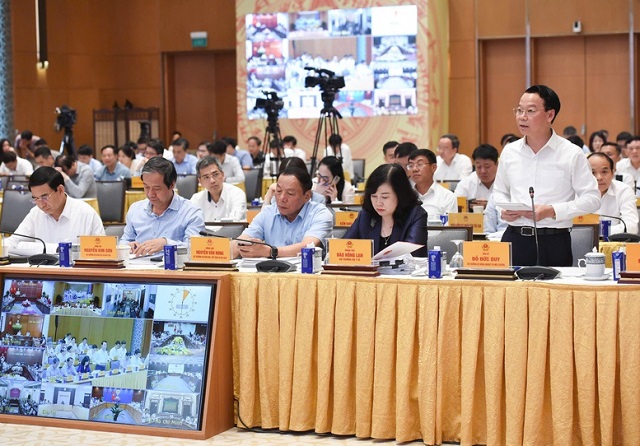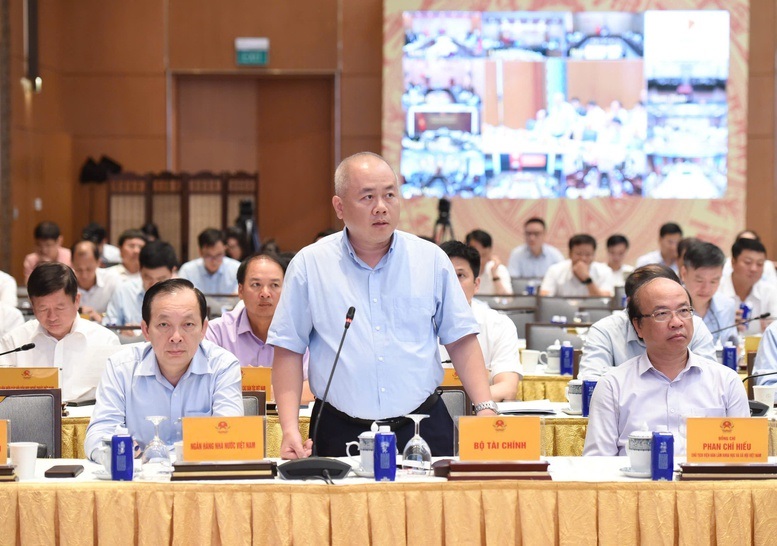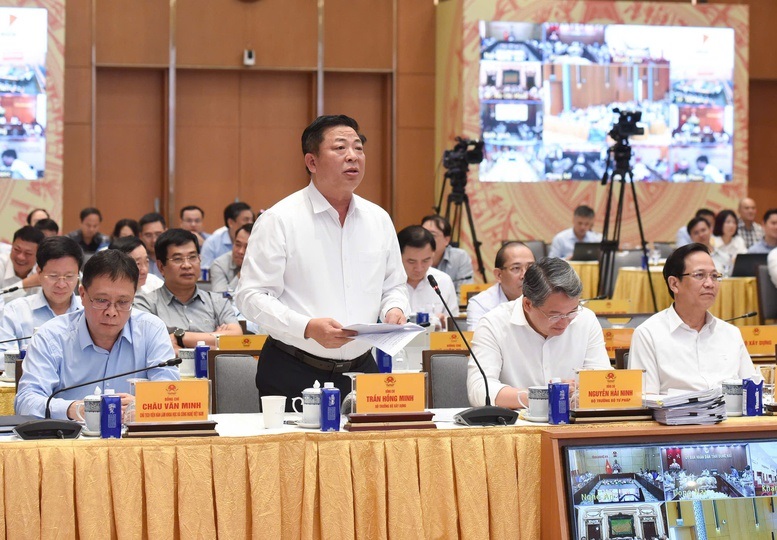
Minister of Agriculture and Environment Do Duc Duy
|
Developing a digital land data system is of utmost importance.
Minister Do Duc Duy acknowledged that, based on the concerns raised by local authorities during the disbursement process, there are four main issues: land origin, land price determination, compensation rates for site clearance, and some issues related to policy transition.
The reasons for these challenges are as follows: First, some localities have been slow to issue detailed regulations; second, adjustments to land prices and compensation rates for site clearance have not been timely, leading to disagreements with the people when applying these rates; third, there are issues with concretizing and applying the transitional provisions on site clearance in the Law and Decree, for which the Ministry has provided guidance to localities with difficulties. Finally, a particularly important issue is related to developing a digital land data system, especially in determining land origins.
“Experience shows that localities that have made efforts to digitize land data as directed by the Prime Minister have not encountered problems. For example, Ha Nam, Bac Ninh, Binh Duong, Da Nang, and Ba Ria-Vung Tau have not faced obstacles in site clearance because all land plots have been digitized, and land origins and statuses have been identified,” the Minister illustrated.
The Ministry of Agriculture and Environment proposed that to accelerate public investment disbursement, localities need to issue complete regulations detailing the implementation of the Land Law and guiding decrees. At the same time, localities should adjust and supplement land prices, compensation rates for crops and assets on the land within their authority. Notably, localities need to actively develop a digital land data system as directed by the Prime Minister.
“Regarding land prices and the auction of land use rights, the Ministry of Agriculture and Environment is in the process of amending and supplementing the relevant regulations and has sent documents to seek opinions from localities. We request that localities continue to provide feedback so that any remaining obstacles can be addressed in the amended decree to make it truly flexible,” Minister Do Duc Duy stated.

Deputy Minister of Finance Nguyen Thanh Trung
|
At the conference, Deputy Minister of Finance Nguyen Thanh Trung also shared the obstacles faced by localities in disbursing public investment capital. Some projects have specific characteristics, such as cultural works that are subject to the Law on Cultural Heritage but lack specific construction regulations for cultural projects. However, the Ministry of Finance emphasized that localities with strong leadership and involvement from the entire political system tend to handle these matters effectively.
Regarding decentralization and devolution, the Ministry of Finance stated that, unlike in the past when investment proposals were submitted to the Prime Minister for approval, the current Law on Public Investment does not require any projects to be approved by the Prime Minister. Instead, full authority has been delegated to ministers, heads of central agencies, and People’s Committees of provinces and cities, who are responsible for the entire process, from project formulation, appraisal, and approval to capital allocation, disbursement, and settlement.
On budget adjustments, while it was previously the National Assembly that made decisions, now the Government has been authorized to create conditions for more flexible planning and adjustment. All pre-deadline capital was previously allocated by the Prime Minister, but now it has been decentralized to local and central levels.
 Minister of Construction Tran Hong Minh – Photo: VGP/Nhat Bac
|
According to Minister Tran Hong Minh, in 2025, important national projects and key transport projects were allocated a total planned capital of VND 145,837.1 billion for the year, accounting for 17.7% of the public investment capital plan for 2025 (VND 825,922.3 billion) approved by the Prime Minister.
According to the Ministry of Finance’s monitoring data, as of April 2025, important and key transport projects disbursed VND 14,361.4 billion, equivalent to 9.8% of the year’s plan. Among these, projects under the management of the Ministry of Construction disbursed about VND 6,338.1 billion, equivalent to 13.5% of the plan. Projects managed by localities and other units disbursed about VND 8,023.3 billion, equivalent to 8.1% of the plan.
However, the Minister also pointed out that some key national transport infrastructure projects, such as Ho Chi Minh City’s Ring Road 4 connecting Long An, Lien Khuong – Bao Loc (Lam Dong) expressway, Ho Chi Minh City – Moc Bai (Tay Ninh) expressway, and Hanoi’s Ring Road 4 (including the Xuan La – Hoang Dinh section), have been in the investment preparation phase since the end of the previous term. Still, as the current term is coming to an end, the investment procedures have not been completed.
“I would like to emphasize that for the Ho Chi Minh City Ring Road 4 project, there has not been a meeting where I have not expressed my opinion. The Prime Minister has assigned the Ministry of Transport and the Ministry of Construction to report on the investment policy to the National Assembly. We have also sent our opinions to the relevant agencies and suggested that the National Assembly delegations of the provinces with projects provide feedback during the National Assembly sessions to promote the early completion of the appraisal report. However, the Appraisal Council is still not ready. I am unsure if the obstacle lies with the locality or the central level. Therefore, I propose that localities, when encountering difficulties in project implementation, directly report to the host to promptly address them,” the Minister stated.
Minister Tran Hong Minh also requested that the provincial Party Secretaries and People’s Committee Chairpersons attending the conference carefully consider the opinions of the ministries and the conclusions of the Prime Minister to jointly identify and overcome bottlenecks and obstacles in practical implementation.
Regarding site clearance, the Minister mentioned that while some localities have performed well, others have made little progress.
“For example, in Ba Ria-Vung Tau, there was a case where site clearance took two to three years to resolve. But when the local leaders got involved, the site clearance was completed in less than a month. This shows that the issue lies in the methods, organizational implementation, and the role and responsibility of the entire political system. There needs to be a synchronized and strong commitment; otherwise, even a year would not be enough to complete the task if it is left to a few officials in charge of site clearance,” he added.
Furthermore, site clearance in localities, especially in the lowlands, tends to be more challenging than in mountainous areas. Therefore, stronger determination and more resolute actions are required. Sometimes, we may be too fixated on institutions, policies, or initial compensation rates. If leaders at all levels get involved, things will become more accessible.
For instance, for households that need to relocate for resettlement, if the mechanism allows, consider providing additional support (for example, VND 60 million per household) related to the construction of resettlement housing without violating legal regulations. This will make the people happier and more agreeable, avoiding obstacles that delay the project,” suggested the Minister.
Another issue raised by Minister Tran Hong Minh was the “unacceptability of a unit being assigned a project and then transferring or assigning it to another unit.” Given the scale and volume of work, it is necessary to directly assign projects to capable units or contractors and directly assign them to the implementing unit/project management unit to meet the progress requirements. If there are documents or difficulties in implementation, units need to report to the competent authority for timely guidance to ensure construction time and capital efficiency.
Regarding decentralization and authorization to localities, the Ministry of Construction has issued a directive in the form of an official dispatch to all units and levels regarding decentralization and authorization. If a unit does not implement 100% decentralization and authorization of the volume of work within its authority, the Ministry of Construction will strictly handle violations.
– 08:50 21/05/2025
















